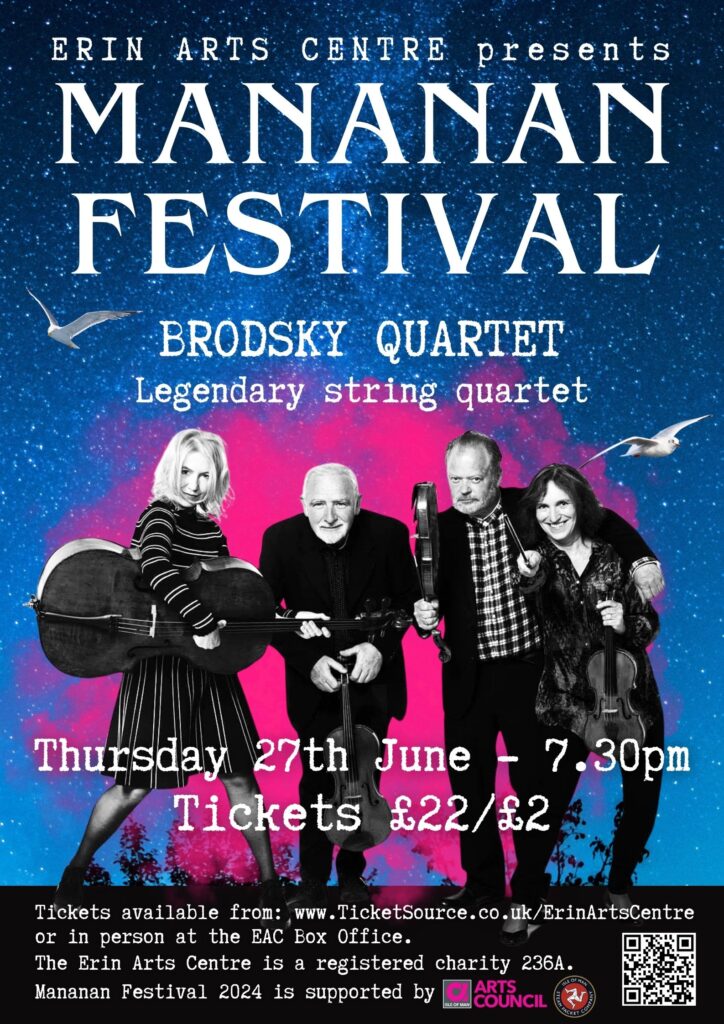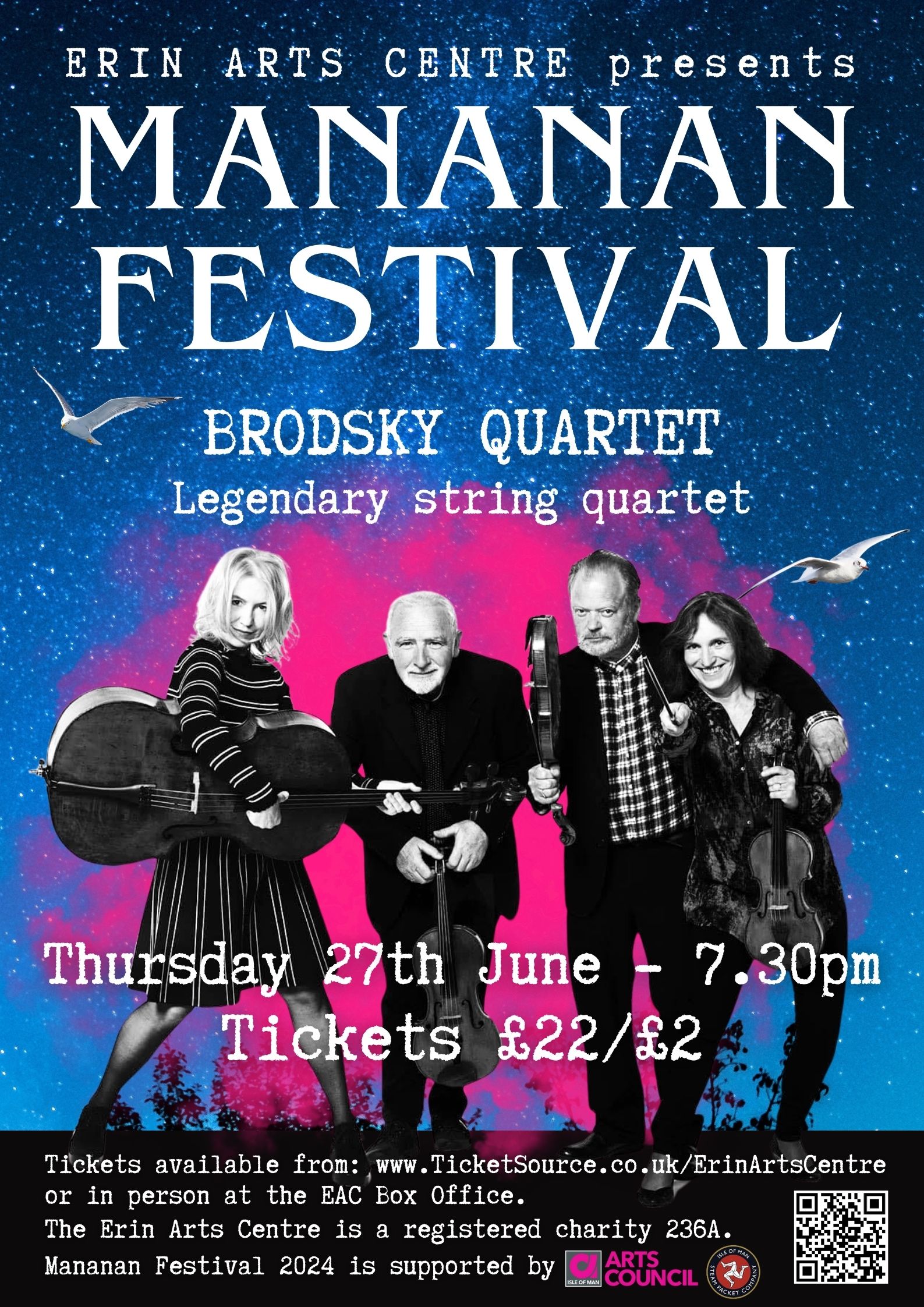
As we head into Mananan week, we continue to give you the lowdown on the artists appearing on this week’s bill. Today it’s the turn of the Brodsky Quartet, who recently reached the incredible milestone of 50 years in the business. They have earned their legendary status and are looking forward to a return visit to the EAC stage!
The Brodsky Quartet started life in the North-East England town of Middlesbrough in 1972. Brother and sister Michael and Jacqueline Thomas with friends Ian Belton and Alexander Robertson, all living within half a mile of each other, used to congregate at the Thomas family home after Youth Orchestra on Friday nights to play quartets; their enthusiasm and passion for the medium took hold. Since forming in 1972, the Brodsky Quartet have performed over 3,500 concerts on the major stages of the world and released more than 70 recordings.
Performances progressed from entertaining parents and neighbours with little soirees of highly ambitious repertoire for kids of 10 to 12, to concert halls and competitions including First Prize for Chamber Music at the National Festival of Music for Youth, which culminated in the first ever Schools’ Prom (now a national institution) in which they performed Shostakovich to thousands of excited school children in the Royal Albert Hall, London. In those early days as they discovered Shostakovich who was still relatively obscure, his music not readily available in music shops in the West, they were so keen to play the works that they wrote out their own parts from radio broadcasts of the works’ premieres.
In 1982 Robertson left the group to pursue other interests and was replaced by violist Paul Cassidy, recently graduated from the RCM in London where he too had developed a passion for string quartets. At this point the group had signed with their first International agent and their Wigmore Hall debut, that same year to great critical acclaim, put them firmly on the map.
In 1992, still only in their early 30s, they celebrated their 20th anniversary with a series at London’s QEH and their own charity festival for Save the Children and Children in Need, in a little church in a backwater of Maida Vale, London, inviting artists such as Barry Douglas, Evelynn Glennie, Orchestra of the Age of Enlightenment, John Amis and many more. The final concert was the world premiere of a ‘Work in Progress’ with Elvis Costello whom they had recently met, resulting in the joint writing and recording of the ground-breaking work The Juliet Letters, a song cycle for quartet and voice, which has become an icon of cross-genre output. The subsequent world tour, documentary and record-breaking CD sales gathered a huge fan base for the album, which endures to this day, as well as the coveted Edison Award. It was re-released for the 15th Anniversary in 2007 with the addition of bonus tracks of encores from the original tour. The long-standing friendship and working relationship with Elvis has continued to play an important part in the quartet’s on-going tour schedule, as well as collaborations with other leading figures from ‘across the divide’, including Björk and Paul McCartney, performing with the latter at St James’ Palace in the presence of Prince Charles, in London and New York for the Standing Stone concert and later for the Memorial Concert of Linda McCartney.
In 1999, Michael Thomas left the group to settle in Seville with his Spanish wife and children and to pursue his conducting career, to be replaced by Andrew Haveron, a graduate of the RCM under Felix Andraevsky. They also continued to work with many diverse artists from all genres with whom they have devised exciting and innovative projects.
In 2003 the quartet devised and realised an educational project aimed at teenagers with the support of the Arts Council and NESTA. This work took them, with a team of composers, writers, artists and musicians, to schools all over the UK where they motivated hundreds of youngsters to write songs for quartet and voice, many of which contributed to the album Moodswings which came out of the project. The format has been repeated in other countries, including Holland and Iceland, with a lasting legacy of many students taking up musical training who might never have done so.
In 2007, Andrew left the group to take up the post of Leader of the BBC Symphony Orchestra and was replaced by Daniel Rowland, highly respected and established chamber musician and soloist. Whilst continuing to tour and record standard repertoire, they also collaborated on several interesting theatrical ventures, including Brian Friel’s play Performances, with Rosamund Pike and Henry Goodman at Wilton’s Music Hall, London; a music-theatre inspired clarinet quintet, In Memoriam, by Paul Barker with Joan Enric Lluna; and their children’s show ‘A Young Person’s Guide to the String Quartet’ with ‘Anna and the Moods’, their 21st century Peter and the Wolf, with the help of human-dynamo and actor John Telfer as narrator and be-wigged Joseph Haydn.
The quartet’s 40th anniversary year was full of exciting opportunities for celebration, including presenting a concert called the ‘Wheel of 4tunes’, in which a huge wheel containing 40 string quartets was spun four times by audience members to select a programme – fun but extremely stressful! In 2018 Daniel left the Quartet to concentrate on his solo work and we were lucky to find a wonderful replacement in Gina MacCormack. We spent two great years together, though sadly one of them was marred by the pandemic. The break in concerts forced by the pandemic did at least afford us the time to regroup. The stars have aligned once more in bringing us the wonderful Krysia Osostowicz.
Emerging from the strange pandemic years, the quartet is busier than ever. Celebrating their 50th anniversary in 2022 they marked the milestone with several exciting events throughout the season, including two of the group publishing memoirs recounting their fascinating 50 year history. There was another acclaimed Shostakovich Cycle over two days at their London home, King’s Place, bringing to a fitting end their fulfilling ten year residency at the hall.

